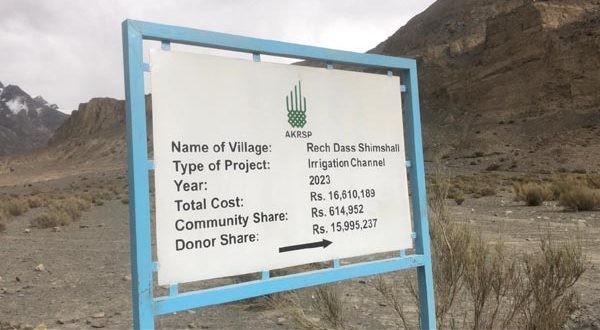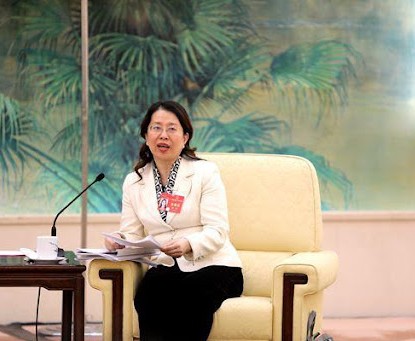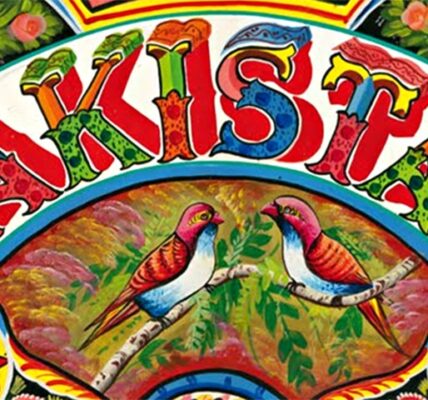Nestled amidst the majestic peaks of the Karakoram Range in northern Pakistan, the Hunza Valley is renowned for its breathtaking landscapes, vibrant culture, and resilient communities. Despite its natural beauty, the region has faced numerous challenges, including poverty, limited access to healthcare and education, and environmental degradation. In the face of these obstacles, the Aga Khan Rural Support Program (AKRSP) has emerged as a beacon of hope, empowering local communities and fostering sustainable development in the Hunza Valley.

Origins and Mission:
Founded in 1982 by His Highness the Aga Khan, the AKRSP is a pioneering rural development initiative that seeks to improve the quality of life for marginalized communities in Pakistan’s mountainous regions. Inspired by the principles of self-reliance, community participation, and sustainable development, the program aims to address the root causes of poverty and empower communities to become agents of change in their own development.
Community-Led Development:
At the heart of the AKRSP’s approach is the belief in the power of communities to identify their own needs and drive their own development initiatives. Through a process of participatory planning and decision-making, local residents are actively involved in every stage of the development process, from identifying priority areas for intervention to implementing and managing projects. This bottom-up approach ensures that development efforts are tailored to the unique needs and aspirations of each community, thereby maximizing their impact and sustainability.
Focus Areas:
The AKRSP’s interventions in the Hunza Valley span a wide range of sectors, including agriculture, education, healthcare, infrastructure, and natural resource management. In the realm of agriculture, the program has introduced innovative techniques and technologies to improve crop yields, enhance soil fertility, and increase farmers’ incomes. Similarly, in the education sector, the AKRSP has established schools, vocational training centers, and scholarship programs to expand access to quality education and empower the region’s youth.
Sustainable Livelihoods:
One of the hallmarks of the AKRSP’s approach is its emphasis on promoting sustainable livelihoods and economic opportunities for rural communities. Through initiatives such as microfinance, skills training, and enterprise development, the program has helped local residents generate alternative sources of income, reduce their dependence on traditional livelihoods, and improve their overall standard of living. By fostering entrepreneurship and innovation, the AKRSP has empowered individuals to break the cycle of poverty and build brighter futures for themselves and their families.
Environmental Conservation:
In a region as ecologically sensitive as the Hunza Valley, environmental conservation is paramount. Recognizing the importance of preserving natural resources for future generations, the AKRSP has implemented various projects aimed at promoting sustainable environmental practices, conserving biodiversity, and mitigating the impact of climate change. From reforestation initiatives to water management schemes, the program’s efforts have not only safeguarded the region’s natural heritage but also enhanced its resilience to environmental challenges.
Impact and Future Directions:
Over the past four decades, the AKRSP’s interventions in the Hunza Valley have made a tangible difference in the lives of countless individuals and communities. By empowering local residents, building their capacities, and creating opportunities for socio-economic development, the program has helped transform the landscape of the region and unlock its full potential. Looking ahead, the AKRSP remains committed to its mission of promoting inclusive and sustainable development in the Hunza Valley and beyond, reaffirming its status as a catalyst for positive change in Pakistan’s rural areas.
In conclusion, the Aga Khan Rural Support Program stands as a shining example of how grassroots initiatives can catalyze transformational change and empower communities to build brighter futures. In the Hunza Valley, where the program’s impact is deeply felt, the AKRSP has not only improved livelihoods and enhanced well-being but also fostered a sense of pride, resilience, and solidarity among local residents. As it continues to forge ahead on its journey of empowerment and development, the AKRSP remains a beacon of hope and inspiration for communities around the world.
Partnerships and Collaboration:
The success of the Aga Khan Rural Support Program in the Hunza Valley is not solely attributed to its own efforts but also to the strong partnerships and collaborations it has forged with local government agencies, non-governmental organizations (NGOs), civil society organizations, and international development partners. By working hand-in-hand with these stakeholders, the AKRSP has been able to leverage resources, expertise, and networks to maximize its impact and reach a wider audience. These partnerships have facilitated the sharing of best practices, the pooling of resources, and the scaling up of successful interventions, ultimately leading to more sustainable and comprehensive development outcomes.
Empowerment and Social Inclusion:
Central to the philosophy of the AKRSP is the principle of empowerment and social inclusion. The program is committed to promoting gender equality, empowering marginalized groups, and ensuring that the benefits of development are equitably distributed among all members of society. In the Hunza Valley, where traditional gender norms and socio-economic disparities persist, the AKRSP has worked tirelessly to empower women, youth, and vulnerable communities through targeted interventions such as women’s entrepreneurship programs, girls’ education initiatives, and social welfare schemes. By giving voice to the voiceless and promoting social justice, the program has helped build more inclusive and resilient communities in the region.
Knowledge Sharing and Capacity Building:
In addition to implementing development projects on the ground, the AKRSP places a strong emphasis on knowledge sharing and capacity building. Through training workshops, seminars, and knowledge exchange programs, the program seeks to build the skills, knowledge, and capacities of local residents, community leaders, and government officials. By investing in human capital development, the AKRSP aims to create a cadre of empowered individuals who can drive sustainable development and governance initiatives in their communities. Moreover, by documenting and disseminating lessons learned and best practices, the program contributes to the broader body of knowledge on rural development and poverty alleviation, informing policy decisions and shaping development agendas at the national and international levels.
Resilience and Adaptation:
As the global development landscape continues to evolve, the AKRSP remains committed to staying agile, innovative, and responsive to emerging challenges and opportunities. Whether it’s adapting to changing climatic conditions, harnessing new technologies, or addressing emerging social issues, the program is constantly evolving to meet the evolving needs of the communities it serves. By fostering a culture of innovation, learning, and adaptation, the AKRSP ensures that its interventions remain relevant, effective, and sustainable in the long run.
In conclusion, the Aga Khan Rural Support Program’s transformative impact in the Hunza Valley is a testament to the power of community-driven development, partnership, and empowerment. By harnessing the potential of local communities, promoting social inclusion, and fostering sustainable livelihoods, the program has not only improved the quality of life for millions of people but also inspired a new generation of development practitioners and change-makers. As it continues to forge ahead on its journey of empowerment and progress, the AKRSP stands as a shining example of what can be achieved when communities come together to build a brighter future for themselves and generations to come.

